- Home
- James L. Swanson
Manhunt
Manhunt Read online
Manhunt
The 12-Day Chase for Lincoln’s Killer
James L. Swanson
For my parents, Lennart and Dianne Swanson
I have never had a feeling politically that did not spring from the Declaration of Independence . . . that which gave promise that in due time the weights should be lifted from the shoulders of all men, and that all should have an equal chance.. . . Now, my friends, can this country be saved upon that basis? . . . If it can’t be saved upon that principle . . . if this country cannot be saved without giving up on that principle . . . I would rather be assassinated on this spot than to surrender it.
—president-elect abraham lincoln during a speech on february 22, 1861, ten days before taking the oath of office as the sixteenth president of the united states
This man’s appearance, his pedigree, his coarse jokes and anecdotes, his vulgar similes, and his policy are a disgrace to the seat he holds . . . he is . . . the tool of the North, to crush out, or try to crush out slavery, by robbery, rapine, slaughter and bought armies . . . a false president yearning for a kingly succession . . .
—john wilkes booth to his sister at a private home shortly before president lincoln’s reelection in november 1864
This story is true. All the characters are real and were alive during the great manhunt of April 1865. Their words are authentic. Indeed, all text appearing within quotation marks comes from original sources: letters, manuscripts, affidavits, trial transcripts, newspapers, government reports, pamphlets, books, memoirs, and other documents. What happened in Washington, D.C., in the spring of 1865, and in the swamps and rivers, and the forests and fields, of Maryland and Virginia during the next twelve days, is far too incredible to have ever been made up.
—james l. swanson
Booth’s Escape Route
It looked like a bad day for photographers. Terrific winds and thunderstorms had swept through Washington early that morning, dissolving the dirt streets into a sticky muck of soil, garbage, and horse droppings. Women, for their own safety, were advised to stay indoors. The ugly gray sky of the morning of March 4, 1865, threatened to spoil the great day. One block east of the Capitol Building, a patent lawyer and part-time photographer named William M. Smith set up his camera and pointed its lens at the temporary wood platform that had been hastily erected over the East Front steps. His job was to make a historic photograph—the first image ever taken during a presidential inauguration of the recently completed great dome. Smith adjusted his apparatus until his lens framed the panoramic, vertical view, from the low-lying plinth of Horatio Greenough’s marble statue of George Washington on the lawn to the tip top of the dome, crowned by Thomas Crawford’s bronze statue of “Freedom.” Abraham Lincoln had ordered that work on the dome continue during the war as a sign that the Union would go on.
Closer to the Capitol, and standing on another platform, Alexander Gardner set up his camera to photograph the ceremony. Gardner’s large, glass-plate negatives captured not only images of the president, vice president, chief justice, and other dignitaries occupying the stands, but also the anonymous faces of hundreds of spectators who crowded the East Front scene. One face among them stands out. On a balcony above the stands, standing near an iron railing, a young, black-mustachioed man wearing a top hat gazes down on the president. It is the celebrated actor John Wilkes Booth.
Abraham Lincoln rose from his chair and advanced toward the podium. He was now at the height of his power, with the Civil War nearly won. In one hand he held a single sheet of paper, typeset and printed in double columns. The foreboding clouds threatened another downpour. Then, reported Noah Brooks, journalist and friend of the president, the strangest thing happened: “Just at that moment the sun, which had been obscured all day, burst forth in its unclouded meridian splendor, and flooded the spectacle with glory and light. Every heart beat quicker at the unexpected omen . . . so might the darkness which had obscured the past four years be now dissipated.” The president’s text was brief— just 701 words.
“Fondly do we hope—fervently do we pray—that this mighty scourge of war may speedily pass away. . . .With malice toward none; with charity for all; with firmness in the right, as God gives us to see the right, let us strive on to finish the work we are in; to bind up the nation’s wounds; to care for him who shall have borne the battle, and for his widow, and his orphan—to do all which may achieve and cherish a just and lasting peace, among ourselves, and with all nations.”
Subsequent events would soon change how witnesses recalled Lincoln’s greatest day. To Noah Brooks, “Chiefly memorable in the mind of those who saw that second inauguration must still remain the tall, pathetic, melancholy figure of the man who . . . illuminated by the deceptive brilliance of a March sunburst, was already standing in the shadow of death.”
On April 3, 1865, Richmond, Virginia, capital city of the Confederate States of America, fell to Union forces. It was only a matter of time now before the war would finally be over. The rebellion had been crushed, and the North held a jubilee. Children ran through the streets waving little paper flags that read “Richmond Has Fallen,” “We Celebrate the Fall of Richmond,” or “Victory Will Lead to Peace: The Right Stripe.” Across the country, people built bonfires, organized parades, fired guns, shot cannons, and sang patriotic songs. Four days later, John Wilkes Booth was drinking with a friend, the actor Samuel Knapp Chester, at the House of Lords saloon, on Houston Street in New York City. Booth struck the bar table with his fist and regretted a lost opportunity. “What an excellent chance I had, if I wished, to kill the President on Inauguration day! I was on the stand, as close to him nearly as I am to you.”
In response to a throng of serenaders who marched onto the White House grounds and begged him to address them, Abraham Lincoln appeared at a second-floor window below the North Portico on April 10 to greet this crowd of citizens celebrating General Grant’s victory at Appomattox the previous day. Lincoln did not have a prepared text, and he was unwilling to speak on a subject of any consequence, including his postwar policy for the South. He resorted to his favorite oratorical device to distract and disarm an audience— humor.
“I see that you have a band of music with you.. . . I have always thought ‘Dixie’ one of the best tunes I have ever heard. Our adversaries over the way attempted to appropriate it, but I insisted yesterday we fairly captured it. I presented this question to the Attorney General, and he gave it as his legal opinion that it is our lawful prize. I now request the band to favor me with its performance.”
Crushed by the fall of Richmond, and by the fire that consumed much of the rebel capital, John Wilkes Booth had left New York City on April 8 and returned to Washington. The news there was worse. On April 9, Lee and the Army of Northern Virginia surrendered to Grant at Appomattox. The cause was lost. Booth wandered the streets in despair until he encountered Henry B. Phillips, who invited him to walk to Birch’s saloon and share a drink. Inconsolable, Booth accepted. “Yes, anything to drive away the blues.” Lee’s surrender, Booth says, “was enough to give anyone the blues.”
On the night of April 11, a torchlight parade of a few thousand citizens, with bands and banners, assembled on the semicircular driveway in front of the Executive Mansion. Journalist Noah Brooks, a favorite of Lincoln’s, was with the president and watched the throng from a window below the North Portico: “After repeated calls, loud and enthusiastic, the president appeared at the window, which was a signal for a great outburst. There was something terrible in the enthusiasm with which the beloved Chief Magistrate was received.” Elizabeth Keckley, Mary Lincoln’s black dressmaker and confidante, felt the mood too. “Close to the house the faces were plainly discernible, but they faded into mere ghostly outlines on the outskirts of the assembly; and what added
to the weird, spectral beauty of the scene, was the confused hum of voices that rose above the sea of forms, sounding like the subdued, sullen roar of an ocean storm.”
This time Lincoln was ready. He had written a long text, short on exultation and designed to prepare the people for reconstruction. When someone in the crowd shouted that he couldn’t see the President—“A light! A light!”—Tad Lincoln volunteered to illuminate his father: “Let me hold the light, Papa!” Lincoln dropped each page of his manuscript to the floor when he finished reading it, and Tad scooped them up.
“We meet this evening, not in sorrow, but in gladness of heart. The evacuation of Petersburg and Richmond, and the surrender of the principal insurgent army, give hope of a righteous and speedy peace whose joyous expression can not be restrained. In the midst of this, however, He from Whom all blessings flow, must not be forgotten . . . no part of the honor . . . is mine. To General Grant, his skilful officers, and brave men, all belongs.” Lincoln then discussed the newly organized state government of Louisiana: “It is also unsatisfactory to some that the elective franchise is not given to the colored man. I would myself prefer that it were now conferred on the very intelligent, and on those who serve our cause as soldiers.”
As Lincoln spoke, Elizabeth Keckley, standing a few steps from him, observed that the lamplight made him “stand out boldly in the darkness.” She feared he was the perfect target. “What an easy matter would it be to kill the President, as he stands there! He could be shot down from the crowd,” she whispered, “and no one would be able to tell who fired the shot.”
In that crowd, standing amidst the throng below Lincoln’s window, was John Wilkes Booth. He turned to his companion, David Herold, and denounced the speech.
“That means nigger citizenship,” he said, “now, by God, I’ll put him through.”
As Booth left the White House grounds and walked toward Lafayette Square, he spoke to another companion, Lewis Powell: “That is the last speech he will ever give.”
On the evening of April 13, the city celebrated the end of the war with a grand illumination. Public buildings and private homes glowed from candles, torches, gaslights, and fireworks. It was the most beautiful night in the history of the capital. The next Evening Star newspaper reported the wondrous display:
Last night Washington was all ablaze with glory. The very heavens seemed to have come down, and the stars twinkled in a sort of faded way, as if the solar system was out of order and the earth had become the great luminary. . . . Far as the vision extended were brilliant lights, the rows of illuminated windows at a distance blending into one, and presenting an unbroken wall of flame . . . high above all towered the Capitol, glowing as if on fire and seeming to stud the city below with gems of reflected glory as stars light upon the sea. Away to the right a halo hung over the roofs, rockets flashed to and fro in fiery lines, and the banners waved above the tumultuous throng, where shouts and cheers rolled up in a dense volume from the city, and with the incense of the grand conflagration, drifted away to the darkness of the surrounding hills.
John Wilkes Booth had seen all of this—the grand illumination, the crowds delirious with joy, the taunting insults to the fallen Confederacy and her leaders. He returned to his room at the National Hotel after midnight. He could not sleep. He reached for pen and paper and wrote a melancholy letter to his mother, Mary Ann Holmes Booth. It was early in the morning of April
Dearest Mother:
I know you expect a letter from me, and am sure you will hardly forgive me. But indeed I have nothing to write about. Everything is dull; that is, has been till last night. (The illumination.)
Everything was bright and splendid. More so in my eyes if it had been a display in a nobler cause. But so goes the world. Might makes right. I only drop you these few lines to let you know I am well, and to say I have not heard from you. Excuse brevity; am in haste. Had one from Rose. With best love to you all, I am your affectionate son ever,
John
“I Had This Strange Dream Again Last Night”
John Wilkes Booth awoke Good Friday morning, April 14, 1865, hungover and depressed. The Confederacy was dead. His cause was lost and his dreams of glory over. He did not know that this day, after enduring more than a week of bad news and bitter disappointments, he would enjoy a stunning reversal of fortune. No, all he knew this morning when he crawled out of bed in room 228 at the National Hotel, one of Washington’s finest and naturally his favorite, was that he could not stand another day of Union victory celebrations.
Booth assumed that April 14 would unfold as the latest in a blur of eleven bad days that began on April 3 when Richmond, the Confederacy’s citadel, fell to the Union. The very next day the tyrant, Abraham Lincoln, visited his captive prize and had the audacity to sit behind the desk occupied by the first and last president of the Confederate States of America, Jefferson Davis. Then, on April 9, at Appomattox Court House, Robert E. Lee and his glorious Army of Northern Virginia surrendered. Two days later Lincoln made a speech proposing to give blacks the right to vote, and last night, April 13, all of Washington celebrated with a grand illumination of the city. And today, in Charleston harbor, the Union planned to stage a gala celebration to mark the retaking of Fort Sumter, where the war began four years ago. These past eleven days had been the worst of Booth’s young life.
He was the son of the legendary actor and tragedian Junius Brutus Booth, and brother to Edwin Booth, one of the finest actors of his generation. Twenty-six years old, impossibly vain, preening, emotionally flamboyant, possessed of raw talent and splendid élan, and a star member of this celebrated theatrical family—the Barrymores of their day— John Wilkes Booth was willing to throw away fame, wealth, and promise for his cause. Handsome and charismatic, he was instantly recognizable to thousands of fans in both the North and the South. His physical beauty astonished all who beheld it. A fellow actor once described him: “Picture to yourself Adonis, with high forehead, sweeping black hair, a figure of perfect youthful proportions and the most wonderful black eyes in the world. Such was John Wilkes Booth. At all times his eyes were his striking features but when his emotions were aroused they were like living jewels.” Booth’s passions included fine clothing, delectable women, and the romance of lost causes.
Booth’s day began in the dining room of the National, where he was seen eating breakfast with Miss Carrie Bean. Nothing unusual about that—Booth, a voluptuous connoisseur of young women, never had trouble finding female company. Around noon he walked over to Ford’s Theatre on Tenth Street between E and F, a block above Pennsylvania Avenue, to pick up his mail. Accepting correspondence on behalf of itinerant actors was a customary privilege Ford’s offered to friends of the house. Earlier that morning Henry Clay Ford, one of the three brothers who ran the theatre, ate breakfast and then walked to the big marble post office at Seventh and F and picked up the mail. There was a letter for Booth.
That morning another letter arrived at the theatre. There had been no time to mail it, so its sender, Mary Lincoln, used the president’s messenger to bypass the post office and hand-deliver it. The Fords did not even have to read the note to know the good news it contained. The mere arrival of the White House messenger told them that the president was coming tonight! It was a coup against their chief rival, Grover’s Theatre, which was offering a more exciting entertainment: Aladdin! Or
“The most beautiful black eyes in the world.” John Wilkes Booth at the height of his fame.
His Wonderful Lamp. Master Tad Lincoln and chaperone would represent the family there. The letter, once opened, announced even greater news. Yes, the president and Mrs. Lincoln would attend this evening’s performance of Tom Taylor’s popular if tired comedy Our American Cousin. But the big news was that General Ulysses S. Grant was coming with them. The Lincolns’ timing delighted the Fords. Good Friday was traditionally a slow night, and news that not only the president—after four years a familiar sight to Washingtonians—but also General Grant, a rare visito
r to town and fresh from his victory at Appomattox, would attend, was sure to spur ticket sales. This would please Laura Keene, who was making her one thousandth performance in the play; tonight’s show was a customary “benefit,” awarding her a rich share of the proceeds. The Lincolns had given the Fords the courtesy of notification early enough in the day for the brothers to promote their appearance and to decorate and join together the two boxes—seven and eight— that, by removal of a simple partition, formed the president’s box.
By the time Booth arrived at Ford’s, the president’s messenger had come and gone. Sometime between noon and 12:30 p.m. as he sat outside on the top step in front of the main entrance to Ford’s reading his letter, Booth heard the galvanizing news. In just eight hours the subject of all of his brooding, hating, and plotting would stand on the very stone steps where he now sat. This was the catalyst Booth needed to prompt him to action. Here. Of all places, Lincoln was coming here. Booth knew the layout of Ford’s intimately: the exact spot on Tenth Street where Lincoln would step out of his carriage; the place the president sat every time he came to the theatre; the route through the theatre that Lincoln would walk and the staircase he would ascend to the box; the dark, subterranean passageway beneath the stage; the narrow hallway behind the stage that led to the back door that opened to Baptist Alley; and how the president’s box hung directly above the stage. Booth had played here before, most recently in a March 18 performance as Pescara in The Apostate.

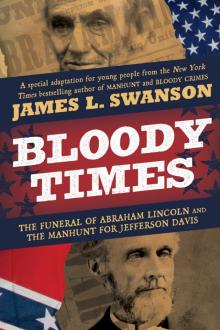 Bloody Times: The Funeral of Abraham Lincoln and the Manhunt for Jefferson Davis
Bloody Times: The Funeral of Abraham Lincoln and the Manhunt for Jefferson Davis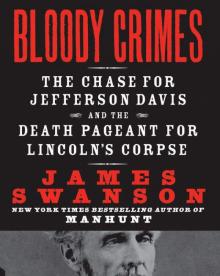 Bloody Crimes: The Funeral of Abraham Lincoln and the Chase for Jefferson Davis
Bloody Crimes: The Funeral of Abraham Lincoln and the Chase for Jefferson Davis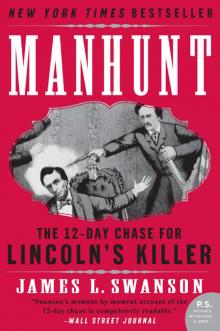 Manhunt: The 12-Day Chase for Lincoln's Killer
Manhunt: The 12-Day Chase for Lincoln's Killer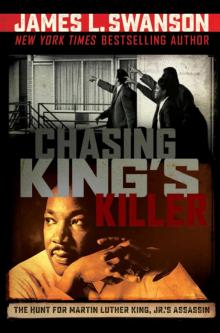 Chasing King's Killer: The Hunt for Martin Luther King, Jr.'s Assassin
Chasing King's Killer: The Hunt for Martin Luther King, Jr.'s Assassin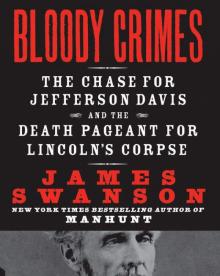 Bloody Crimes
Bloody Crimes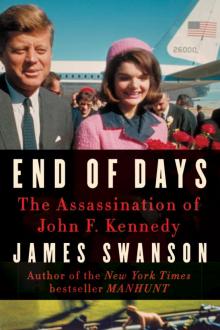 End of Days
End of Days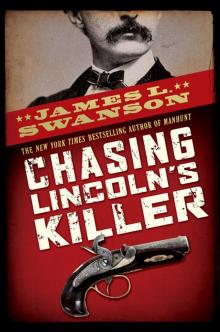 Chasing Lincoln's Killer
Chasing Lincoln's Killer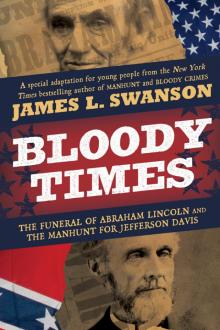 Bloody Times
Bloody Times Manhunt
Manhunt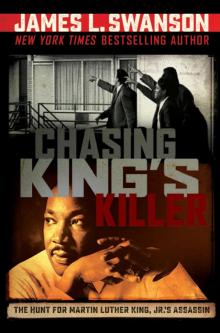 Chasing King's Killer
Chasing King's Killer